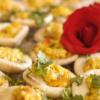Search the Community
Showing results for tags 'Chinese'.
-
In a post on the hoisin thread Anna N asks for some ideas for dipping sauces for egg rolls. Any thoughts?
-
i end up buying hoisin sauce at the supermarket when i don't have a chance to get to chinatown to find a brand that looks "authentic." however, the sauces vary so much in flavor that i'm not even sure what the stuff is supposed to taste like! looking through my pantry now, and reviewing the ingredients lists, i see that they are oftentimes made from completely different ingredients. most are heavy in some sort of sweetner. they seem to have varying amounts of soy product, and some contain tomato paste. the bottom line is, they are all quite different in flavor. what should one look for on a label? if anyone could go as far as to suggest a brand, that wouldn't hurt either.
-
When you steam a Chinese dish what kind of steamer do you use? What dishes do you steam?
-
Today, I picked up, experimentally, some frozen prawn and chive dumplings from a supermarket in Chinatown. They were made by Royal Gourmet, a brand that turns out to be a subsidiary of the Royal China restaurant group. The packet listed no ingredients (fairly sure that's illegal; there was a space for them so maybe a glitch) and had no cooking instructions. Another packet of frozen dim sum I looked at said to steam for 15 mins, so I tried that with half the dumplings. They disintegrated. The other half I steamed for half the time. They tasted fine, and if I'm still posting tomorrow evening I guess the food poisoning wasn't too severe. Any tips on how to judge this kind of thing, though, in the absence of directions? Quality-wise, they were just okay. (I note I'd be unlikely to buy equivalent frozen versions of Western dishes. Strange.)
-
What are best, most popular and newest Chinese restaurants in Paris?
-
LA has one of the most vibrant Chinese food scenes. You can drive forever through Monterey park and adjacent neighborhoods and see one restaurant after another, from fancy HK style dim sumeries to mom and pop places. What's really good these days? What's new?
-
My friend loves to hunt. He loves his dog. He writes, sometimes about food. And for 4 years that I know of, he has been on a quest to cook and eat a dog. I assume he would only do this where the law (and culture) permit. Though in his heart I know he dreams of chowing down at some little out of the way storefront in Flushing and discovering that the mystery meat in the casserole was not sold by the pound, but AT the pound. So far, (when last I heard), his quest has gone unfulfilled. So calling all you intrepid eaters, especially you Cantonese and Korean types, I want to hear about the real thing. Unleash those reminiscences! Some of you must have had dog skin in Beijing or Seoul.
-
I have recently noticed fresh high quality shitake mushrooms in Chinatown. They are exported from China and seem to be a different (and superior) variety than those grown here. They are what the Chinese call 'flower' mushrooms due to the lines and crenellations in their caps (when dried, these sell for a premium over the other types of shitakes). They sell for the reasonable sum of $3-5/lb.
-
What do you think are the basics a novice must have before starting Chinese cooking? What are your favorite stores in NYC where one can find these ingredients? Are there mail order places one can buy from? And any other tips for someone like me that has never cooked Chinese food would be much appreciated.
-
The food diary thread (keep them coming) has got me thinking about my relationship to Asian (particularly Chinese) food. [i'm not going to start trying to make sushi at home except maybe as an entertainment.] Although I think its incidence may have been exaggerated over the past couple of weeks, it's clear to me that Chinese and related cuisine is a very regular part of my diet, but that I almost never attempt to cook it at home. There are a couple of reasons for this. Firstly, experience: I am confident I know more or less what I'm doing with European dishes generally. Meats and fish turn out fine, pasta and risotto probably better than the average decent restaurant over here (although some notches below the best). On the other hand, my occasional attempts at Chinese dishes are unarguably worse than the average decent restaurant. Of course, this is related to the relatively tiny amount of experience I have. The main issue here is fear of the wok. This may be partly rational, viz. the widespread line that you can't cook well with a wok on a domestic gas hob. Related to this is the speed of cooking: I am used to tasting throughout the process and adjusting amounts, speed and heat accordingly. Wok-cooking seems more like Superman in the telephone kiosk: when do you get to respond to what's happening? Then there's the sheer number of ingredients that seem to be involved in many Chinese recipes, versus European ones. Concerns here include both managing the increased number of variables and simply managing to control a decent larder of useable ingredients. Then there's the fact I don't have a rice cooker ... Firstly, then, is this something I should be pursuing, or is it best left to the several good-to-very-good restaurants within comfortable walking distance of where I live? And if so, am I best just continuing to bash along until I improve, in which case can somebody recommend a good book to work through, or should I think about an evening course or something?
-
So, whatever became of this proposed Banquet?
-
Have any egulleters tried Indian Chinese? This is a wonderful combination, I think many of you had a taste of this thanks to Suvir at Diwan -- the garlic cauliflower I would love to get some discussion going in this area... I would be happy to share some recipes here as well Thoughts? Comments?
-
Hello Ed Thanks for joining us. Your replies here sure are making fascinating reading, even for someone who won't get close to most of the places in the USA you talk about Chinese (and I think most Oriental) meals are generally structured in the form of a mini-buffet, with groups of dishes in the centre of the table and diners taking small portions of two or three dishes at a time into their own bowls to eat. It occurs to me that this creates some interesting restraints, and opportunities for Chinese meals. On the one hand, the balance of dishes becomes quite complex, ensuring an appropriate variety and quantities of vegetables, accompaniments, sauces and meat dishes. On the other hand (do I sound like Jackie Mason ?) this must give a chef exciting opportunities to mix and match components. How is a relatively untrained diner to get the best out of this form of self-service ? Which types of dish, in what sequence, provide the best experience ? Or is it safe to assume that dishes served on the table at one time will all "go together" well ?
-
I know your latest book will deal with how to make well known dishes, but are there a few most important tips you could share on how to best make Chinese food at home?
-
One thing I have noticed about Chinese food vs Western is a greater appreciation of texture, particularly gelatinous textures. eg: - Prized products sharks fin, birds nest or abalone, which seems to be prized for texture as much as flavour - Sea slug, fish maw, bamboo pith! - Chicken feet! I wonder what your thoughts are on this one - is there more emphasis on texture that in the West (bearing in mind it /was/ the French who brought us pied de cochon)? How important is texture vis-a-vis taste? Why do the chinese seem to dig gelatinous so much? cheerio J
-
Do you have experience of Chinese restaurants in London. If so, any comments? v
-
I'd be interested in some examples of dishes in which certain Chinese wines are utilized for braising (e.g., in certain abalone preparations), are included in a marinade or sauce or are otherwise deployed. What might the unusual taste or aroma qualities of certain Chinese wines utilized in cooking be, in your assessment?
-
Ed, thank you for taking time to answer our questions. Could you say anything about how you judge the quality of a Chinese meal, either the menu or individual dishes? I realise that this may be difficult because of the variety of Chinese cooking traditions, but are there common features you look for? Are there particular dishes that are good tests of the skill of a restaurant? I ask this in part because I've just returned from Hong Kong. We had some extraordinary meals, all Cantonese. The fish and vegetables, in particular, were better in texture and flavour than most dishes I get in restaurants here. What would you look for?
-
Ed, what Chinese cookbooks do you like? What is your book going to cover?
-
Ed - Even though the number of different Chinese cuisines available today is far greater then when I was growing up (70's), I feel like the general quality of Chinese cuisine in NYC has deteriorated over the last 30 years. Do you find this to be the case as well? Or are we just more knowledgable these days and as a result we have become tougher to please? I have found that most Chinese food these days is a mass-produced version of Hong Kong cuisine, especially banquets. If I went to Golden Unicorn, Ping's, Sweet 'n Tart of The Nice Restaurant, could I tell the difference between their Salt Baked Squid?
-
Hi Ed. So, I wouldn't consider it too terribly unusual in the year 2002 for a nice American boy to become interested in Chinese cuisine. But to become obsessed with it in 1973? Now that's unusual. What happened? What flipped the switch in your head that made you into the Chinese-food guy?
-
At the time one is puzzled by the perplexing question of the first Creation of the earth and of man, or troubled about the sources of defeat or victory and success or catastrophe in the Iliad and the Odyssey, some of us are simply pursuing a passion toward the baby pig. Of several conversations I had with Ms. X (an eGullet dining companion), there was none that did not contain a reference to the baby pig she recently tried at New York Noodle Town. Well, since Montaigne wisely noted that among three classes of philosophers (those who claim to have found the truth; those who deny that truth can be found; and those who confess their ignorance and go on searching) only the last are wise, we decided to pursue our search for the truth about the perfect baby pig by setting a lunch date to be held at New York Noodle Town. Using self-exploration to help illuminate the world may be quite noble in some instances but very disturbing in others. In my case, not taking into consideration the late hour we set for the lunch and leaving the house with nothing but three grapes consumed in a hurry, which added to a quite elaborate symphony successfully conducted by my stomach while passing by China town’s cozy little restaurants and cafés with their enticing smells teasing my senses with the provocative images of delightful and tempting food, wasn’t very smart. Well, the good thing about the bad thing is that everything comes to an end, and, in my case, it was the end of my sufferings as soon as the three of us were seated at a cozy table for four. “I am so hungry! All I had today were three grapes,” said Ms. X while browsing the menu. If one could ever think of a better time to start believing in fate or telepathy or any other weird stuff, that certainly was a good one. Not just any hunger, but the “hunger of three grapes” and the thoughts of the baby pig added a communal sense, and bonded us for life. We ordered: Barbecued baby pig Salt baked seafood combination Roast duck with flowering chives Sizzling casserole with chicken and Chinese sausage The baby pig served at room temperature was certainly a star. A nearly perfect execution of crisp skin and tender baby flesh provoked no less than cute little sounds of satisfaction exchanged among us all, not overlapping but rather creating a perfect harmony. The meat was a little tiny bit too salty for me, but again, I may just be a supertaster. The salt baked seafood combination wasn't as good as I remembered it from two years ago. More or less crisp while still hot, it turned soggy upon cooling, like a balloon losing air. The roast duck with flowering chives was very good indeed. Not as crisp as it would’ve been had we ordered duck separately from the chives, the meat was very tender and added a certain ducky flavor to the chives that was definitely worth trying. What I liked the most was that the dish was not overwhelmed with the flavor of the brown starch sauce, contrary to what we had at New Lok Kee in Flushing. The sizzling casserole was quite sizzling when it was brought to our table. We all agreed that it wasn’t spectacular, but pretty good. To be fair, though, we were quite full by that time. I’ll let others chime in with more details. Overall, the food made us happy, and that is probably the best praise one can give. As to Montaigne, he was wrong. We did find the truth about the perfect baby pig in New York Noodle Town.
-
In my local Chinese supermarket I have noticed cyrovac bags of "Wind dried Duck" legs. What is it, how is it made and can I use it instead of confit duck legs?
-
Every time I have ever been served orange slices at a Chinese restaurant, I've noticed that the oranges are sliced perpendicular to the blossom & stem end. The oranges are sliced down the equator, exposing the fruit in its multiple sections rather than in wedges that can be easily removed from the skin. Does anyone know why it is that oranges are served this way at Chinese restaurants? I don't consider this a wrong or a right thing, I'm simply curious to know if there is some logic or superstition behind this. Thanks, Rich
-
I've been completely dissatisfied with the roast pork and related roasted meat items from the Chinese restaurants in my neighborhood, and I refuse to believe that my only choice is to get this stuff in Chinatown. In addition, given how cheap pork is in supermarkets it seems logical that I should be able to make pounds and pounds of the stuff for the price of one small portion in a restaurant. So what's the basic procedure for making, say, that nice red roast pork at home? What cut of pork is used, what do you need to do to it before cooking, and how do you cook it? Please assume zero knowledge on my part (always the case).










